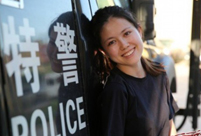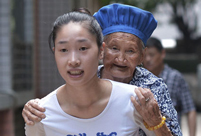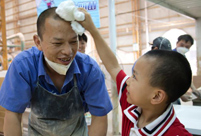 Amphibious armored vehicle unit conducts open sea drill
Amphibious armored vehicle unit conducts open sea drill
 Water relay in Henan
Water relay in Henan
 Ethnic culture feasts eyes of travelers
Ethnic culture feasts eyes of travelers
 80 security dogs assembled in Nanjing police dog training base
80 security dogs assembled in Nanjing police dog training base
 Graffiti artists paint on street walls in Xinjiang
Graffiti artists paint on street walls in Xinjiang
 Story of ceramic artist Zhang Lingyun
Story of ceramic artist Zhang Lingyun
 Magic summer night dream in Hongyuan
Magic summer night dream in Hongyuan
 Incredible creatures in headwaters drainage region of Lancang River
Incredible creatures in headwaters drainage region of Lancang River
 The future of rock n' roll seen in young rockers in China
The future of rock n' roll seen in young rockers in China
 Magnificent Yanziya Cliff
Magnificent Yanziya Cliff
China's youths are getting increasingly frustrated, and the government has to take effective measures to address the issue in order to maintain social peace.
A significant percentage of today's youths are well educated, tech-savvy and hooked to global culture, and an increasing number of them now study overseas. However, there is a real divide between China's urban and rural youths. The massive expansion in higher education in China has mainly benefited young people living in cities. In the countryside, the quality of schools is inferior and access to computers difficult.
Moreover, with an income gap between urban and rural residents of 4-to-1, people living in the countryside have far fewer resources - and thus are more likely to be condemned to poverty.
That does not seem so terrible given that two-thirds of China's youth population live in cities. There is a crucial distinction to be made, however: Half of these young people, in effect, are full urban residents, thanks to the residency status of their parents, while the other half isn't so lucky. Under the hukou (household registration) system, the unlucky half lacks that right - and is, in effect, an urban underclass.
The fact that half of China's rural youths have moved to cities does not really help when it comes to the most important tool of self-advancement - education. These youths may be living in cities, but they still hold a rural hukou, which denies them access to education, healthcare and other social services in their place of residence. Migrant workers not being able to access to such services in cities is one of the factors driving China's widening inequality.
The government has announced that it would loosen the hukou system over time, but we will have to await the outcome. One reason for skepticism is that relaxing the hukou system could have adverse effects on the budgets of city governments and many urban residents are not keen to share their privileges with migrants from rural areas.
This underclass generally ends up doing semi-skilled jobs in the informal sector. With few rights and little protection, these people are often denied their labor rights. The reason why this is of great concern not just to China but also the world is that today's young workers are less docile than their parents. As China's pool of surplus labor dries up, younger workers do not shy away from protesting against the abuse of labor rights, as evident in the growing number of labor unrest.
So, what is the dream of China's urban underclass? Quite simply to become permanent urban residents and live with dignity.
 |
 Beautiful policewoman in an anti-terrorism SWAT team
Beautiful policewoman in an anti-terrorism SWAT team Cute photos of little Taoist nuns and monks go viral online
Cute photos of little Taoist nuns and monks go viral online Amphibious armored vehicle unit conducts open sea drill
Amphibious armored vehicle unit conducts open sea drill A post-90s girl who takes grandma to work
A post-90s girl who takes grandma to work Beijing policewomen posters become a hit
Beijing policewomen posters become a hit Armored regiment trains on the sea
Armored regiment trains on the sea Children spend 'Father's Day' with dads at work
Children spend 'Father's Day' with dads at work 'Pan Da' appear in Shanghai World Financial Center
'Pan Da' appear in Shanghai World Financial Center Champions take selfies on podium
Champions take selfies on podium The vanishing folk skills
The vanishing folk skills Intoxicating beauty of Dali, Yunnan province
Intoxicating beauty of Dali, Yunnan province Memorable moments of Ludian earthquake
Memorable moments of Ludian earthquake Bring world together to help elephant
Bring world together to help elephant 'Building Dreams'
'Building Dreams'  Labrang Monastery
Labrang MonasteryDay|Week|Month